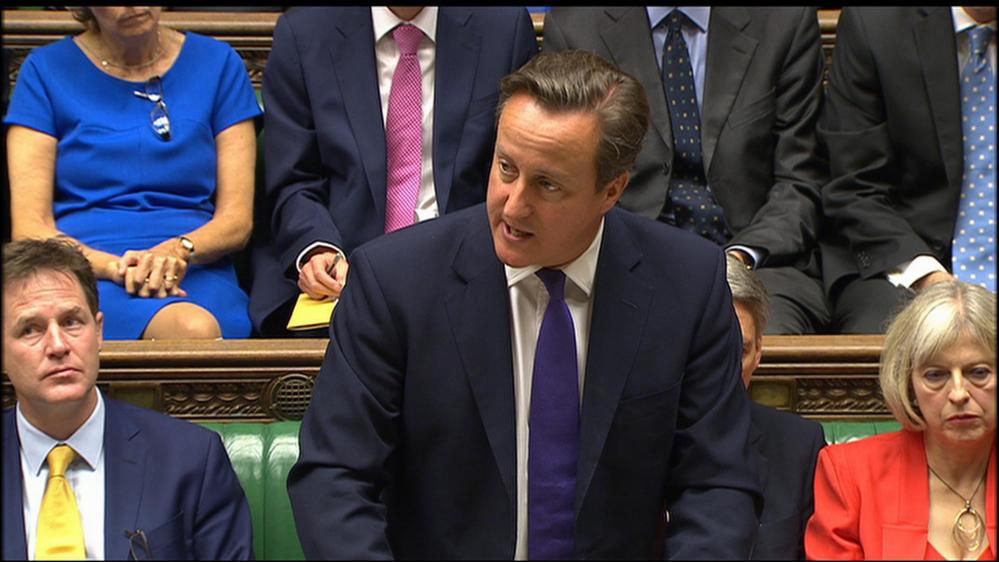LONDON – Britain, Belgium and Denmark on Friday joined the U.S.-led coalition of nations that are launching airstrikes on Islamic State group in Iraq, committing warplanes to the struggle against the extremists.
The European lawmakers flatly described the moves as critical to security on home soil, arguing that facing down terrorists has become a matter of urgency.
British Prime Minister David Cameron made a passionate plea for action in drastic terms – noting that the militants had beheaded their victims, gouged out eyes and carried out crucifixions to promote goals “from the Dark Ages.”
“This is about psychopathic terrorists that are trying to kill us and we do have to realize that, whether we like it or not, they have already declared war on us,” he said. “There isn’t a ‘walk on by’ option. There isn’t an option of just hoping this will go away.”
Cameron told a tense House of Commons during more than six hours of debate that the hallmarks of the campaign would be “patience and persistence, not shock and awe” – a reference to the phrase associated with the invasion of Iraq.
That unpopular intervention has cast a shadow over the discussions because critics fear that Europe will be drawn into a wider conflict, specifically taking on the Islamic group’s fighters in Syria.
British lawmakers voted 524-43 for action after being urgently recalled from a recess. Belgian also overwhelmingly approved, voting 114-2 to take part, despite widespread concerns that more terrorism may follow in their homeland as a result.
In May, Belgium was shaken when a gunman opened fire at a Jewish museum in Brussels, killing four people. The suspect, French citizen Mehdi Nemouche, has been identified as a returning Islamic fighter from Syria, and leaders in Belgium and other European countries have expressed their fears that other returnees from Syria and Iraq may cause further havoc.
“We must fight against torture, against decapitations, so it’s time to act,” said Belgian lawmaker Veli Yuksel, a Flemish Christian Democrat
Denmark pledged seven F-16 fighter jets. Prime Minister Helle Thorning-Schmidt said her government would send four operational planes and three reserve jets along with 250 pilots and support staff for 12 months. Lawmakers in Denmark must also approve, but that is considered a formality.
“No one should be ducking in this case” she said. “Everyone should contribute.”
Britain is expected to deploy Tornado GR4 aircraft, a handful of which are in Cyprus, within striking distance of northern Iraq.
The Tornados give the coalition an enhanced ability to hit moving targets with the use of the Dual Mode Brimstone missile, said Ben Goodlad from IHS Jane’s. He said the weapons have a particular ability to hit convoys and fleeing targets.
The British resolution does not address any action in Syria, though many lawmakers tried to push the government to admit that this is the likely next step.
Cameron has justified action in Iraq as lawful because the Iraqi leadership has asked for help.
No European nation has yet agreed to join the U.S. and some Arab states in strikes in Syria.
The motion before Britain’s Parliament set no time limit, and that caused unease. Many lawmakers suggested the fight could stretch for years.
“ISIL is a death cult, it’s a gang of terrorist murderers. It’s not an army and it’s certainly not an army that’s going to be destroyed by aerial bombardment,” said legislator George Galloway, using a former name for the radicals.
Cameron ensured his success by keeping the motion narrowly tailored – staving off the defeat suffered a year ago when Parliament shot down the idea of intervening in Syria to thwart Assad’s use of chemical weapons.
Defense Secretary Michael Fallon later indicated that the government might later ask Parliament for support for Syrian airstrikes.
“ISIL is based in Syria, that’s where its headquarters are, that’s where its resources, its people are. To deal with ISIL you do have to deal and defeat them in both Iraq and in Syria,” he told BBC. “We are taking this in a calm, measured way, step-by-step, but it is clear to us that obviously ISIL, in the end, has to be tackled on a broader front.”
Jan M. Olsen in Copenhagen, Denmark, and John-Thor Dahlburg in Brussels contributed.
Send questions/comments to the editors.



Success. Please wait for the page to reload. If the page does not reload within 5 seconds, please refresh the page.
Enter your email and password to access comments.
Hi, to comment on stories you must . This profile is in addition to your subscription and website login.
Already have a commenting profile? .
Invalid username/password.
Please check your email to confirm and complete your registration.
Only subscribers are eligible to post comments. Please subscribe or login first for digital access. Here’s why.
Use the form below to reset your password. When you've submitted your account email, we will send an email with a reset code.